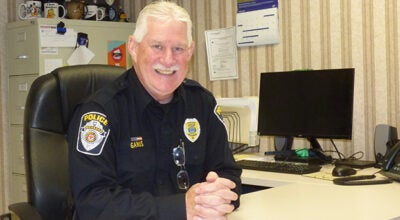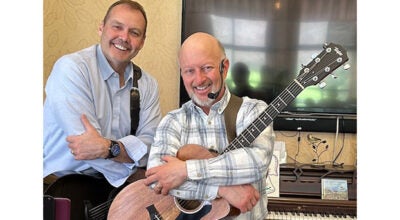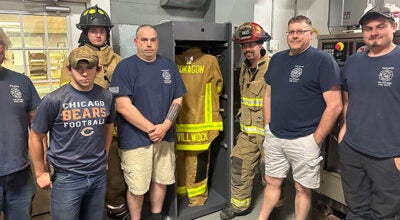Retiring Niles teachers reflect on 38 years of change
Published 10:54 pm Thursday, May 20, 2010
By JESSICA SIEFF
Niles Daily Star
Lessons learned – that may just be a running theme when looking back on the 2009-2010 school year, and also for those teachers bracing for retirement.
Ginny Forest, a special education teacher at Ring Lardner Middle School in Niles, and Rich Beymer, an English teacher at Niles High School, are two teachers who will end their careers this year, both having taught for 38 years.
“I was really accountable to no one”
For all but two years at the beginning of her career, Forest has taught special education at Ring Lardner in Niles.
Her beginnings consisted of a small classroom full of toys. “No books,” she said. “No academics of any kind.”
She’d been warned that might be the case while she was studying in college. The lack of materials provided meant there was an abundance of materials created.
“I went around to the school and asked the teachers there if I could borrow some of the books that they were maybe not using.
“Nobody checked on me about the curriculum being taught,” she said. “There was really no accountability. I was really accountable to no one.”
Quite a different environment from the one teachers are operating in now. Forest believes there are pros and cons to every form of teaching.
Where she was once forced to create a learning environment, the one she’s in now is quite dedicated in regards to students.
“At this point I’m in an inclusion classroom,” Forest said. “I’m with my students in all four of their core courses.”
Being a special education teacher, Forest said, her work is with students who are of “normal intelligence, but they have a (learning) impairment. I try to accommodate them to their area of weakness so they can be successful.”
Forest has had time to perfect her own style of teaching – but with so many teachers like her and Beymer, putting down their extensive teaching careers and making way for fresh, new, still learning teachers – are there pros or cons to that idea as well?
“That’s the trade-off,” she said. “There are always trade-offs. Experience of the older teachers. Of course they could probably hire two new teachers for the price of an older teacher. I think new blood is good – fresh ideas, more innovative things they come to the table with.”
Forest said the district is losing one teacher she declined to name who “has not been here very long. And she’s disheartened. It’s not what she thought it would be. She’s an excellent teacher and we’re losing her and it’s sad.”
Incoming teachers, fresh out of college or within their first year or so teaching in some cases, Forest said, “are not fully aware of the reality of education today until they’re here for a few years.”
What is that reality?
“They don’t tell you in college about some of the things, No. 1, that maybe these kids face due to their background, where they’re coming from, with some of the things that we as teachers may automatically take for granted, where the families are very different than what we’re used to,” Forest said. “And I think many times we’re not really fully prepared for that. And I think every person that comes into education comes with these wonderful expectations and has a true love of learning and I think they become very disillusioned when they find out that many of the students don’t love to learn or don’t have that spark of loving or wanting to learn.
“It’s a real dilemma,” she said. “How do you hook kids into that love of learning? It’s a difficult dilemma.”
Still there are advantages, Forest said. Learning the ropes may come with time, as does navigating a sea of young minds.
But technology, that takes something else altogether.
Incoming teachers seem to be far more versed in utilizing technology than some older teachers, Forest said. And considering how technological advances has changed the way people think, speak, write and even add – knowing how to use it is something that will only benefit students.
Forest plans to keep busy following her retirement, something that came after some thought from the teacher.
“I had no intention of retiring at the begining of the year,” she said. “Actually it was the economy more than anything,” that led to the decision.
“I think it’s going to be a few years before we can build back up to where we were,” she said. “This is the time.”
“It’s hard for me to imagine doing anything else…”
Beymer spent 28 years teaching in Indiana and the last 10 years at Niles High School.
When it comes to retirement, this is the time for him as well. When he started at Niles High School that first day, he’d made the decision to retire after 10 years.
“I’ve always planned it,” Beymer said. “I set the goal then.
“I want to retire while I still like it, while I still enjoy it. I want to retire on my terms. One should never overstay one’s welcome.”
Though the shaky budgetary ground Michigan school districts have been sitting on as of late isn’t the reason for Beymer’s retirement, he still recognizes its impact on what seems to be a virtual exodus of experienced teachers.
The state’s “budget problems have been chronic,” he said. A vast difference from when he first started at Niles a decade ago.
Taking all the elements that go into education – faced especially by today’s teachers – does Beymer still find it fun to teach?
“Every time you walk into a classroom and work with young people – yes,” he said. “That part of teaching is the part that I will miss. I will not miss the meetings. I will not miss silly paperwork,” and he will not miss bureaucratic elements that find their way into the classroom.
“It happens,” he said of the fact that several things have “exacerbated” the retirement of many area teachers. “Every once in a while there is a generational shift.”
He’s not worried about leaving his department and it seems as though Beymer believes the students will be in good hands.
He’ll keep in touch with friends and co-workers and he might even be back in the building from time to time.
But on the first day of school next year, Beymer said, he’ll likely be found on lakefront property in northern Indiana – “watching the world go by.”
He got into teaching following family influences and three high school English teachers who he had in a row that had a significant impact on him.
Does he feel he’ll have had a similar impact on his students?
“I wish,” he said. “You often don’t know.”
Over time, Beymer said he’s learned that kids generally stay the same. “Being a kid is being a kid,” he said. But students today are much more open with adults than they used to be.
And they face more pressures, he said.
Which, it would seem, makes having capable teachers all the more important.
“You better be flexible,” Beymer said. “And have patience. Those things – I want to get out before I lose those two things.”
Being around his students, Beymer said, has helped him keep “a proper perspective.”
As his career comes to an end, what does he see?
“It’s hard for me to imagine having done anything else for 38 years,” he said.






